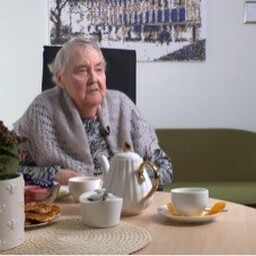2017. aasta augusti öösel kukkus Helgi Aavistu oma kodus. Ta tundis, kuidas üks kehapool läks tuimaks. Naise päästis telefon, millega ta
helistas 112
. Arstid ja päästeamet tulid kohale. Nad viisid Helgi kiirabiga Tallinnasse. Helgi ütles: 'Mind päästis see, et mind Tallinnasse viidi.'
helistas 112
Tõlge fraasile: helistas 112
EN
called 112
Helgi
veetis haiglas kaks kuud
. Pärast haiglat naasis ta tühja korterisse. Tema lapsed elavad välismaal. Sotsiaaltöötaja tõi talle kord nädalas süüa. Naaber Viivika Kattago aitas ka. Viivika koristas ja tõi ajalehti. Helgi
kasutas karku, et liikuda
. Kuid ühel päeval kark vedas alt ja Helgi kukkus. Pärast seda ta
vahetas kargu rulaatori vastu
. Helgi ütles: 'Ma ei läinud enam õue, sest ma elan neljandal korrusel.'
veetis haiglas kaks kuud
Tõlge fraasile: veetis haiglas kaks kuud
EN
spent two months in the hospital
kasutas karku, et liikuda
Tõlge fraasile: kasutas karku, et liikuda
EN
used a walker to move around
vahetas kargu rulaatori vastu
Tõlge fraasile: vahetas kargu rulaatori vastu
EN
replaced the walker with a rollator
Viis kuud tagasi sai Helgi teise insuldi. Ta kukkus õhtusöögilauas ja jäi põrandale terveks ööks. Hommikul ta helistas sotsiaaltöötajale. Töötaja tuli koos naabri ja kiirabiga. Kiirabi tõstis Helgi põrandalt üles, kuid ei viinud teda haiglasse. Helgi ütles: 'Nad ei teinud rohkem midagi.'
Mare Abner on 79-aastane. Ta on elanud liikumispuudega. Ta on aastaid võidelnud puuetega inimeste õiguste eest. Poolteist aastat tagasi sai Mare vigastada. Ta kukkus trepist ja
murdis käe
. Sellest ajast ei saa ta treppe kasutada. Mare ei saa iseseisvalt kodust välja. Tütar Janika Paulus aitab teda. Mare proovis leida lahendusi, kuidas iseseisvalt korterist välja saada. Lift rõdule oleks kallis. Tõstuk trepikotta oleks odavam, kuid ka see on Mare jaoks liiga kallis.
murdis käe
Tõlge fraasile: murdis käe
EN
broke her arm
Mare
ei pääse rõdule
, sest uks on kitsas ja lävepakk kõrge. Linnaosavalitsus on nõus aitama rahaga, kuid Mare peab kõike ise korraldama. Janika ütles, et linnast reaalset abi ei saadud. Praegu pakub omavalitsus Marele koduhooldust. Talle tuuakse kolm korda nädalas süüa ja koristaja aitab kodu puhtana hoida.
ei pääse rõdule
Tõlge fraasile: ei pääse rõdule
EN
cannot access the balcony
Helgi Aavistu elab nüüd Tapa hooldekodus. Ta on seal turvaliselt. Kuid nii Helgi kui Mare arvavad, et hooldekodusse minek peaks olema
viimane variant
. Mare ütles: 'Paljud eakad jäävad koju lõksu, sest nende majades pole lifti.'
viimane variant
Tõlge fraasile: viimane variant
EN
the last option
One night in August 2017, Helgi Aavistu fell at home. She felt one side of her body go numb. The woman was saved by a phone, with which she called 112. Doctors and rescue services arrived. They took Helgi to Tallinn by ambulance. Helgi said: 'I was saved because I was taken to Tallinn.'
Helgi spent two months in the hospital. After the hospital, she returned to an empty apartment. Her children live abroad. A social worker brought her food once a week. Neighbor Viivika Kattago also helped. Viivika cleaned and brought newspapers. Helgi used crutches to move around. But one day the crutch slipped and Helgi fell. After that, she replaced the crutches with a rollator. Helgi said: 'I no longer went outside because I live on the fourth floor.'
Five months ago, Helgi had another stroke. She fell at the dinner table and lay on the floor all night. In the morning, she called the social worker. The worker came with a neighbor and an ambulance. The ambulance lifted Helgi off the floor but did not take her to the hospital. Helgi said: 'They didn't do anything more.'
Mare Abner is 79 years old. She has lived with a mobility impairment. She has fought for the rights of people with disabilities for years. A year and a half ago, Mare was injured. She fell down the stairs and broke her arm. Since then, she has not been able to use the stairs. Mare cannot leave the house independently. Her daughter Janika Paulus helps her. Mare tried to find solutions to get out of the apartment independently. A lift to the balcony would be expensive. A stairlift would be cheaper, but even that is too expensive for Mare.
Mare cannot access the balcony because the door is narrow and the threshold is high. The local government is willing to help financially, but Mare has to arrange everything herself. Janika said that no real help was received from the city. Currently, the municipality provides Mare with home care. She is brought food three times a week, and a cleaner helps keep the house tidy.
Helgi Aavistu now lives in a nursing home in Tapa. She is safe there. But both Helgi and Mare believe that moving to a nursing home should be the last option. Mare said: 'Many elderly people are trapped in their homes because their buildings lack elevators.'

